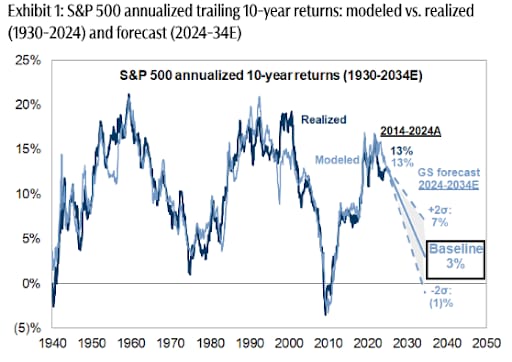- L-Plate Retiree
- Posts
- The Myths and Truths of Living to 100
The Myths and Truths of Living to 100
What Dan Buettner discovered when he searched the world’s longest-living communities

because retirement doesn’t come with a manual

Pause in the party: markets take a breather.
The quick scan: U.S. stocks cooled on Thursday, ending a strong run with modest losses across the board. The S&P, Dow and Nasdaq all slipped slightly as investors weighed valuation concerns and signs the rally might be overstretched.
S&P 500: –0.30% to 6,735.11 — first meaningful pullback after a long stretch of gains
Dow Jones: –0.50% to 46,358.42 — broad pressure on industrials and financials
NASDAQ: –0.10% to 23,024.63 — tech held up slightly better, but still slipped
What’s driving it: The rally in AI has carried markets, but fears of overvaluation are mounting. Gold’s pullback signals traders may be lightening exposure. Meanwhile, the U.S. government shutdown continues to cloud data and policy outlooks, nudging investors toward caution.
Bottom line: A dip after a run is healthy — a chance for consolidation, not collapse. For L-Plate Retirees, this is your cue: hold your core steady, resist the urge to chase highs, and use pullbacks to reassess risk rather than panic.
Wall Street Isn’t Warning You, But This Chart Might
Vanguard just projected public markets may return only 5% annually over the next decade. In a 2024 report, Goldman Sachs forecasted the S&P 500 may return just 3% annually for the same time frame—stats that put current valuations in the 7th percentile of history.
Translation? The gains we’ve seen over the past few years might not continue for quite a while.
Meanwhile, another asset class—almost entirely uncorrelated to the S&P 500 historically—has overall outpaced it for decades (1995-2024), according to Masterworks data.
Masterworks lets everyday investors invest in shares of multimillion-dollar artworks by legends like Banksy, Basquiat, and Picasso.
And they’re not just buying. They’re exiting—with net annualized returns like 17.6%, 17.8%, and 21.5% among their 23 sales.*
Wall Street won’t talk about this. But the wealthy already are. Shares in new offerings can sell quickly but…
*Past performance is not indicative of future returns. Important Reg A disclosures: masterworks.com/cd.

The Myths and Truths of Living to 100

five of these ladies have been together for 97 years!!
The scoop: When explorer Dan Buettner set out to find the world’s longest-living people, he began with three big myths that many of us still believe about longevity:
Myth #1 – If you try really hard, you can live to 100.
In truth, very few people make it that far on effort alone. Longevity isn’t about willpower; it’s about environment. The people who live the longest never try to live long - they simply live well in surroundings that make healthy choices effortless.Myth #2 – There’s a secret pill or diet.
No single supplement, vitamin, or superfood guarantees a longer life. What matters is a consistent pattern: mostly plant-based eating, moderate portions, and daily, natural movement.Myth #3 – We’re living longer because of medicine.
Medical advances have extended life expectancy, not healthy life span. The goal isn’t just to avoid death, but to stay vibrant, strong, and engaged well into old age.
With those myths debunked, Buettner and his National Geographic team went searching for the truth - and found it in three extraordinary places.
The 3 Blue Zones he studied:
Sardinia, Italy - home to the world’s highest concentration of male centenarians. The secret? Close family bonds, daily physical labour (shepherding those steep hills), and strong community connection. Laughter and red wine also feature liberally.
Okinawa, Japan - where women live longer than anywhere else. Their diet of sweet potatoes, tofu, vegetables, and green tea, along with a strong sense of purpose (ikigai), and tight social circles (moai), form a triple shield against stress and disease.
Loma Linda, California, USA - home to a community of Seventh-day Adventists who live about ten years longer than their neighbours. Their faith encourages rest, plant-forward eating, no smoking or drinking, and a weekly Sabbath that slows life down.
Across these zones, Buettner saw no miracle genetics — just ordinary people shaped by environments that promote movement, connection, moderation, and purpose.
Actionable Takeaways for L-Plate Retirees:
Move naturally: Build activity into your daily life — walk, garden, take the stairs.
Have the right outlook: Take time to downshift and reduce stress; know your purpose.
Eat wisely: Follow the 80 % rule (stop eating when you’re nearly full), favour plant-based foods, and enjoy wine in moderation.
Connect: Prioritise family, nurture your faith or community, and surround yourself with supportive friends.
These habits aren’t fads — they’re patterns woven into daily life. In Buettner’s words, “The world’s longest-lived people don’t have better discipline — they have better surroundings.”
Your Turn:
Which of Buettner’s lessons feels most natural to you — movement, outlook, diet, or connection?
Do your surroundings make healthy living easier or harder?
What small change could make your own home a “mini Blue Zone”?
👉 Hit reply and share your thoughts — your answers could inspire fellow readers in future issues.
☕ If today’s read made you rethink how you design your days (not just your years), you can shout me a coffee on Ko-fi.
Ready to take control of your retirement planning? Join our community of L-Plate Retirees who are learning to navigate this next chapter with confidence (and a bit of humour).
Subscribe now and get practical tips delivered to your inbox every weekday—because retirement doesn’t come with a manual, but it should come with a plan.
And if today’s issue gave you a smile or an “aha!” moment, you can always buy us a coffee on Ko-fi ☕ to keep the ideas brewing.
Because retirement doesn't come with a manual... but now it does come with this newsletter.
The L-Plate Retiree Team
(Disclaimer: While we love a good laugh, the information in this newsletter is for general informational and entertainment purposes only, and does not constitute financial, health, or any other professional advice. Always consult with a qualified professional before making any decisions about your retirement, finances, or health.)

Reply